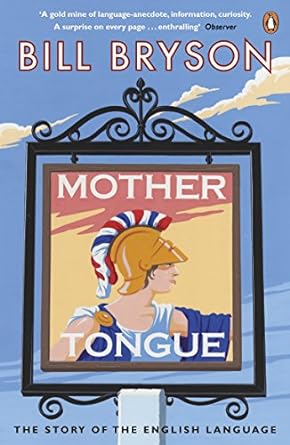Mother Tongue
By Bill Bryson
Summary

| Content | 7/10 |
| Readability | 9/10 |
| Presentation | 8/10 |
| Ideas | 7/10 |
| Value for money | 8/10 |
| Did it do what it said on the box? | 8/10 |
How do the rankings work?
The Review
Very amusing, but needs a refresh
This is an amusing and enjoyable romp through the history of the English language, and a delight for closet linguisticists like myself. Bill Bryson takes us on a fascinating and funny tour of the history of the English language, how it became a (arguably the) world language, how its usage, spelling and grammar vary with time, location and context, and how it continues to develop. However like this reader it’s older than you think…
Amazon have been pushing this book hard recently, and I downloaded the book in Kindle format in the expectation that it was a relatively new work, with an apparent publication date of 2009. However reading the opening chapter I got a strange sense of deja vu, and realised I had read it before, but evidently long before the advent of either e-reading or publishing and cataloguing my own reviews. I reckon I last read this not long after its original publication in 1990, so about a generation ago! It has rewarded a re-read, but has left me thinking how much better a book it might be for an refresh.
A lot has changed in the last 25 years which directly affects our use of language, and particularly English. Foremost in my mind are the end of the Cold War, the rise of the Asian economic powerhouses presenting relatively direct services to the rest of the world, and, above all, the development of the Internet and mobile technologies. The latter have brought the expectation that pretty much any two humans, anywhere, may have both the wish and the technical means to communicate, and across national boundaries will usually use English to do so. Technology has both led and enabled big changes to how we use language, and we increasingly design our messages and evolve our language around the constraints and possibilities of the transmission and consumption platforms. “Thanx”, “R U OK” and “GR8” don’t appear in this book, but they belong there.
It would be great to understand whether the wider use of English is driving greater homogenisation of usage and acceptance of obvious simplifications, or whether we are just further “baking in” the idiosyncrasies, and adding a new layer on top. Does the availability of online resources such as dictionaries and thesauruses drive the wider adoption of correct usage, or is this outweighed by the need for simplification of the message? Do tools such as spell checking, predictive text and automated translation increase or decrease individual language skills?
In fairness to Bill Bryson, he does recognise some of these challenges in his final chapter, and makes many of the right calls on general direction, but the book itself is now a period piece the other side of major technological and geopolitical changes.
Despite the fact that Bryson wrote this book when he had been living in Yorkshire for many years, it has a bit of an American focus, typically assuming that the reader knows the American usage but needs the British explaining. Once you’ve tuned into this it’s fine, but it can throw British (and I suspect other) readers slightly at first. Other slight downsides are that like some of Bryson’s other books it’s arguably a bit too long, and in the last third some of the examples get a bit repetitive, and also some other reviewers suggest that the fact checking, especially around non-English languages, is perhaps a bit suspect.
Having said all that, the books remains highly readable, full of wonderful anecdotes and nuggets of knowledge, and if you accept its horizon, well fills a role which I don’t think is met by any other book which I have read. Enjoy it, but acknowledge and forgive that it’s slightly showing its age.
Buy It From Amazon
Amazon.co.uk  |  | Amazon.com
|

 Thoughts on the World (Main Feed)
Thoughts on the World (Main Feed) Main feed (direct XML)
Main feed (direct XML)